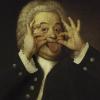Leaderboard
Popular Content
Showing content with the highest reputation on 04/14/2016 in all areas
-
General questions: 1. When did you start studying or playing music? Offically, Grade 7 (in Canada, about 12 years old). Started then with recorder for a few months and then on to band instruments. Trombone for me from the get-go. Previously, had some choir and violin lessons, but little (if anything) stuck. 2. When did you start composing and why? Maybe a tiny bit in high school ... but nothing remotely serious. Started for real in college essentially as required. 3. How do you write your music (do you use notation software, hand written scores, or in sequencers such as DAW and samplers). 90% is hand written at a piano. I'll use a notation program exclusively for notation. Composers who had teachers (i.e. you had a composition professor or a private teacher who taught you composition as oppose to music teachers that allowed you to compose. I have to be very specific): 1. When did you begin taking composition lessons? University...probably not even until 2nd or 3rd year undergrad. 2. Where you required to present a portfolio or some kind of evidence of your composition prior to beginning your lessons? No, was a jazz performance program requirement. 3. Where did you take composition lessons (what university or what region of the world i.e. hometown or country) St. Francis Xavier University (Nova Scotia, Canada) and University of Toronto (Ontario, Canada) 4. What were your composition lessons like (how were they structured, what did you do in them, how long were they) 45mins - 1 hour long. Undergrad - weekly assignments (arrange Melody X for 5 horn jazz octet, write a "Messengers-style" 3 horn chart, reharmonize a standard, analysis of repertoire and traditions) Master's - Long term exploration of single things. (Multiple sessions working on an extended or multiple pieces ) 5. What was your composition teacher like (did they allow you to write what you want or did they give you assignments like “what in this style” or “write for this ensemble or instrumentation” etc.) Ensemble / instrumentation / style was generally somewhat dictated (got looser as you go - higher education got more freedom. Undergrad was a lot more structured. 6. Where your composition lessons a positive or negative experience? Positive, expecially as a means of exploring and understanding styles you wouldn't normally gravitate towards.1 point
-
General questions: 1. When did you start studying or playing music? I recall messing with a keyboard as young as a 4-year-old. By then I could not only play the melody from The Blue Danube by heart in my own toy keyboard - but in any keyboard whatsoever, and even transpose it to another key. I went as far as to "write" my own version of it - my first "original composition". I also took guitar lessons for a few months at age 8-9, and sang in a child choir about the same time. But I didn't start thinking seriously about composition until age 12-13, after being introduced to "classical music" via Beethoven/Tchaikovsky/Mendelssohn. 2. When did you start composing and why? As stated above, as sudden as I was able to play a coherent musical line, I started thinking about making up my own pieces. But "real" composition didn't begin for me until my early teens, after being introduced to the "classical" realm. Beethoven's creative power and Tchaikovsky's flair and orchestration were both hits for me, and I started wondering if I would be able to do that myself. I also felt a need to express myself in a way that would remain somewhat enigmatic, not to openly embarrass myself (I was rather shy by then, and that still haunts me now). And to get a few things out of my head, too - after all, I had several silly melodies which had been haunting me since childhood, so why not turn them into complete works? So I wrote a set of piano short pieces... 3. How do you write your music (do you use notation software, hand written scores, or in sequencers such as DAW and samplers). Early on I had no choice but to write everything by hand. I had no access to notation software, barely knowing it to exist at all. So all what survives of my earliest pieces are sketches done in paper and pencil, mostly fragments of piano works - although I managed to write about 4 or 5 full orchestral scores (including my first 2 symphonies). Nevertheless, I was able to get Finale in 2003, and I'm now using Finale 2011, with which I've created most of my newer works (from Op. 27 onwards) as well as re-scored many older works. Unfortunately I did never learn to take any advantage from DAW and samplers - kind of an "old-fashioned composer" even in this. Composers who are self-taught (i.e. you had no private or group lessons for specifically composition, aside from a composition based assignment in a music class or ensemble): 1. Was the decision to go without a composition teacher a conscious decision or a decision out of circumstance? Explain A mix of both, I'd say - but perhaps if I had not made some sort of a decision to go all-out by myself, I guess I could have pushed harder for lessons. Nevertheless, my upbringing played a role in my choices - down here there aren't many professional paths for composers, as we're a really small country with an overcrowded musical scene, and most newcomers are locked out. I had also some reasons to fear I wouldn't be allowed creative freedom, but rather have a certain style shoved down my throat. So I felt compelled to turn away and move into a more "lucrative" career (which I regret to say hasn't been that "lucrative" at all). 2. What are some of the challenges you have faced being self-taught? Being self-taught is a challenge in itself. I had to learn almost from zero, and I had nothing but three books (on notation, on orchestration and on forms, styles and musical appreciation), but no theory or harmony treatises. I listened to lots of music, and had to find out even the orchestral order of instruments for a score by myself - all of that before the Internet boom! I have also found an almost bigger challenge in validation and confidence. As I was learning, I had absolutely no feedback about what I was doing, other than showing a score here and there to a musically versed teacher or acquaintance. I was stuck in an endless loop of second-guessing and questioning my own works' quality. I only got a real boost in 1997, when my Second Symphony (in a handwritten score!) made it all the way into the final round of an international composition contest. That success briefly brought me into some contact with the musical "establishment" in my country, and allowed me to have another orchestral work read and performed. But the doors quickly closed, without me knowing for sure if I was doing well in any sense. I think this reflects in my music, as my works might show some technical or theoretical weaknesses - although it doesn't affect my personal choice to write in a Romantically-infused style that some might find outdated. Another nagging issue is the missed chance to network with both performers and composers. Granted, my networking skills are disastrous by themselves, but I could have used a few musically conscious friends down the road. I would list also the fact that I don't play any instrument myself, so that might have been different too if I had taken lessons, despite my decision to focus on creation rather than performance. 3. What do you believe some of the strengths are to being self-taught? The single major benefit I could point out is that it gave me the chance to learn without being bullied into any style. I feel free to write the kind of music that I would enjoy listening, instead of what I should be writing according to the Powers that Be. I consider myself a quick learner, and I was bold enough to jump at any chance into orchestral writing, whereas I could have been slowed down or confined into odd chamber ensembles. As it gets, my best bets when composing are piano works or orchestral pieces rather than chamber music, and classical forms rather than experimental ones. 4. What are some of the perceptions you have about taking composition lessons (what do you think it would be to take composition lessons) As I previously said, there was this fear that I would be forced into a writing style. Where I live, it was pretty hard to distinguish one composer's work from another's, as everyone seemed to be attempting to translate folkloric music into classical forms and distort it into atonality - or to overuse percussion in orchestral pieces at the expense of everything else (this hasn't changed too much since I was a teenager). Even now, if I had to take lessons (which I doubt on account of my age), I would rather have them from someone who will give me the tools to do my thing the right way, but also keep the spark alive and help me find new roads without turning composition into a burden rather than a pleasure. 5. Do you think taking composition lessons would be a benefit or a detriment to your composition process? why? I'm pretty sure it wouldn't be detrimental at all. By now I have grasped a lot of concepts, but there's always room for improvement, and knowledge sharing always enriches. I have also somewhat expanded my stylistic boundaries, so perhaps these lessons might help me to do so with less hesitations, while offering validation, feedback, and even networking chances.1 point
-
General questions: 1. When did you start studying or playing music? I started studying/playing music starting in 5th grade (10 years old). I was in the choir and started studying violin. 2. When did you start composing and why? I started composing the next year in 6th grade. Our school got Finale Notepad in the school computer lab, so me and my friends would just mess around writing little nonsensical things. Another reason was that I wanted to arrange some of the music we were playing and experiment with a few changes. This led to me writing my own music eventually. 3. How do you write your music (do you use notation software, hand written scores, or in sequencers such as DAW and samplers). Mostly notation software (Finale) Composers who are self-taught (i.e. you had no private or group lessons for specifically composition, aside from a composition based assignment in a music class or ensemble): 1. Was the decision to go without a composition teacher a conscious decision or a decision out of circumstance? Explain? Hmm, I would say a bit of both. I didn't take composition seriously until late high school/early college so I didn't really think about it that much. Plus, I was already swamped by school work and other extracurricular activities that I wouldn't have had any time. In college, I thought about taking private lessons, but the composition program at my university was virtually non-existent, but I did show my works to some of the music profs for advice and critiques. 2. What are some of the challenges you have faced being self-taught? I didn't take any theory classes in high school or college, so learning all that by myself was obviously a challenge. But this is where all my orchestral experience helped me grasp most theory concepts pretty quickly. I also did take music history classes and an orchestration course so that helped too. Another challenge was that you miss out on networking opportunities with other composers. 3. What do you believe some of the strengths are to being self-taught? In my case, being self-taught gave me the advantage of experimenting with different styles, instead of being pigeonholed to one. Also I don't have deadlines and can compose at my own pace (though that may be a negative at times...) 4. What are some of the perceptions you have about taking composition lessons (what do you think it would be to take composition lessons) I've heard horror stories, and good stories....so kind of a "mixed bag" perception. If I were to take composition lessons, I would take them with someone who I'm really comfortable with and be very frank with (and vice versa). 5. Do you think taking composition lessons would be a benefit or a detriment to your composition process? why? Definitely NOT a detriment. I think taking lessons would probably be beneficial in refining what I already know and improve on.1 point



